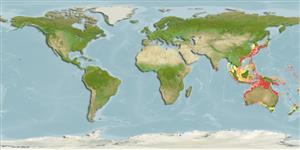Environment: milieu / climate zone / depth range / distribution range
Ecology
Marine; demersal; non-migratory. Temperate
Western Pacific: Taiwan and Japan to Western Australia and New South Wales.
Size / Weight / Age
Maturity: Lm ? range ? - ? cm
Max length : 60.0 cm TL male/unsexed; (Ref. 559)
Vomer without a median series of enlarged fangs; caudal fin reduced, tip of tail blunt; anus behind midlength.
Found on the continental shelf, in less than 100 m depth. Poorly known and included in the Muraenesocidae provisionally, pending further study (Ref. 9830).
Life cycle and mating behavior
Maturities | Reproduction | Spawnings | Egg(s) | Fecundities | Larvae
Paxton, J.R., D.F. Hoese, G.R. Allen and J.E. Hanley, 1989. Pisces. Petromyzontidae to Carangidae. Zoological Catalogue of Australia, Vol. 7. Australian Government Publishing Service, Canberra, 665 p. (Ref. 7300)
IUCN Red List Status (Ref. 130435)
Threat to humans
Harmless
Human uses
Fisheries: of no interest
Tools
Special reports
Download XML
Internet sources
Estimates based on models
Preferred temperature (Ref.
123201): 19.3 - 28.7, mean 27.2 °C (based on 680 cells).
Phylogenetic diversity index (Ref.
82804): PD
50 = 1.0000 [Uniqueness, from 0.5 = low to 2.0 = high].
Bayesian length-weight: a=0.00132 (0.00056 - 0.00309), b=2.93 (2.73 - 3.13), in cm total length, based on LWR estimates for this (Sub)family-body shape (Ref.
93245).
Trophic level (Ref.
69278): 3.8 ±0.6 se; based on size and trophs of closest relatives
Resilience (Ref.
120179): Medium, minimum population doubling time 1.4 - 4.4 years (Preliminary K or Fecundity.).
Fishing Vulnerability (Ref.
59153): Moderate vulnerability (44 of 100).
Nutrients (Ref.
124155): Calcium = 30.7 [19.3, 54.0] mg/100g; Iron = 0.323 [0.194, 0.524] mg/100g; Protein = 18 [16, 20] %; Omega3 = 0.595 [0.285, 1.517] g/100g; Selenium = 21.9 [12.1, 40.4] μg/100g; VitaminA = 12.6 [3.4, 44.4] μg/100g; Zinc = 0.471 [0.349, 0.656] mg/100g (wet weight);
